For enterprise-level commercial and residential portfolio managers, operational efficiency isn't just a goal; it's the core driver of profitability. Every vacant day directly impacts revenue, and slow, manual processes erode margins across a dispersed portfolio of hundreds or thousands of units. The right technology stack can fundamentally transform your operations, from initial listing and lead management to tenant retention and asset optimization.
This guide cuts through the noise to identify the essential apps for commercial real estate and large-scale property management that address the critical pain points of managing dispersed portfolios. We analyze the tools that directly impact your most important metrics: reducing days on market (DOM), accelerating lead-to-lease velocity, and improving cost-per-door efficiency. Making the right technology decision requires a strategic approach. For a deeper dive into the strategic considerations when building your tech stack, exploring insights on choosing the best real estate investment software is crucial for meeting your portfolio's demands.
Whether you're focused on data analytics for smarter acquisitions, marketing automation to fill vacancies faster, or streamlined property management to retain tenants, these are the platforms that provide scalable solutions for today's competitive landscape. Each review includes a detailed breakdown of features, ideal use cases, screenshots, and direct links to help you build a tech stack that outperforms the market.
1. CoStar
CoStar stands as the undisputed titan in commercial real estate data, making it an essential, if not mandatory, platform for serious investors, brokers, and large-scale management firms. It's less of a simple app and more of a comprehensive data and analytics ecosystem. Users leverage its vast, continuously updated database of over 7 million properties to perform critical due diligence, from underwriting and risk analysis to sourcing off-market deals. The platform's strength lies in its verified data; CoStar's teams actively research and confirm lease and sales comps, providing a level of accuracy that is difficult for competitors to replicate at a national scale.
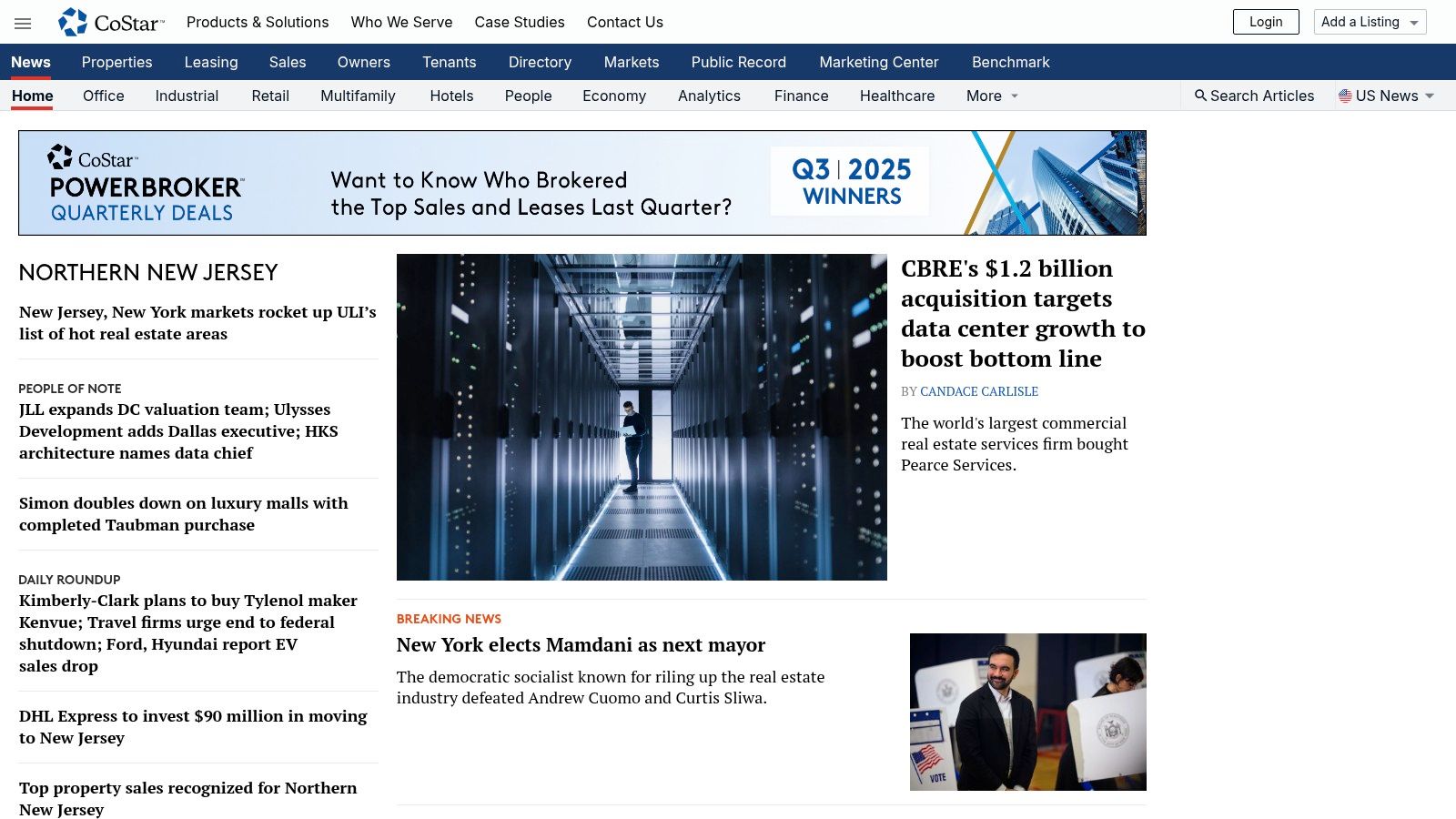
For large portfolio managers, CoStar's Market Analytics module is indispensable. It offers detailed submarket reports, economic forecasts, and expert commentary that inform portfolio strategy and identify growth opportunities. The platform’s purpose-built modules for different CRE roles mean that lenders, appraisers, and owners can access tailored tools for their specific needs, such as the COMPASS tool for CMBS risk analytics.
However, this depth comes at a price. CoStar operates on an enterprise-oriented subscription model, and pricing is not public; it requires direct engagement with their sales team. The sheer volume of data and tools also presents a significant training curve, making it a substantial commitment for any organization. Despite these hurdles, for enterprise-level operations that depend on best-in-class data for high-stakes decisions, CoStar is the industry standard.
- Best For: Enterprise-level investors, national brokerage firms, appraisers, and lenders needing the most comprehensive CRE data available.
- Pros: Unmatched national dataset with verified comps, specialized modules for various CRE professionals, robust market analytics and forecasting.
- Cons: Expensive enterprise-level pricing, steep learning curve due to the platform's complexity.
- Website: https://www.costar.com
2. LoopNet
Where CoStar is the data powerhouse, LoopNet is its public-facing counterpart, functioning as the largest and most recognized commercial real estate marketplace. It is the go-to platform for brokers, landlords, and sellers aiming to achieve maximum exposure for their for-sale or for-lease properties. With an audience of approximately 13 million global searchers monthly, listing on LoopNet ensures that a property reaches the broadest possible pool of potential tenants and buyers. For large portfolio managers, this translates directly to a larger lead funnel, which is the first step in reducing Days on Market (DOM) and minimizing vacancy loss.
LoopNet operates on a tiered advertising model, allowing users to choose from Silver, Gold, Platinum, and Diamond packages to boost their listing's visibility. These premium placements are essential for standing out in competitive markets. The platform also offers integrated marketing services, including professional photography, drone videography, and Matterport 3D tours, to create compelling and professional listings. For brokers and owners who want to leverage LoopNet’s search technology on their own websites, the LoopLink integration provides a seamless way to display listings directly.
However, this extensive reach is not free. While basic searching is available to the public, effective listing and premium placement come at a significant cost, which varies by package and market competitiveness. For those managing large portfolios or operating in high-demand areas, the investment in premium placement can be substantial. Despite this, for professionals whose success hinges on marketing properties effectively and generating leads, LoopNet remains one of the most indispensable apps for commercial real estate.
- Best For: Brokers, landlords, and property owners who need to market properties to the widest possible audience for leasing or sale.
- Pros: The largest public marketplace for CRE, generating massive exposure; tiered advertising options for enhanced visibility; integrated professional marketing services.
- Cons: Premium listings and advertising can be expensive, especially in competitive markets; costs are variable and not transparently priced.
- Website: https://www.loopnet.com
3. Crexi
Crexi has rapidly emerged as a powerful, modern marketplace that combines active listings with an integrated suite of marketing and data intelligence tools. Positioned as an all-in-one platform for brokers, buyers, and tenants, it aims to streamline the entire deal lifecycle from discovery to closing. Its user-friendly interface provides an accessible alternative to more complex data providers, offering a robust national marketplace for both investment sales and leasing opportunities. Brokers and large-scale managers leverage Crexi to market properties to a massive audience, manage leads effectively, and track deal progress in a centralized dashboard, which helps improve lead-to-tour conversion rates.
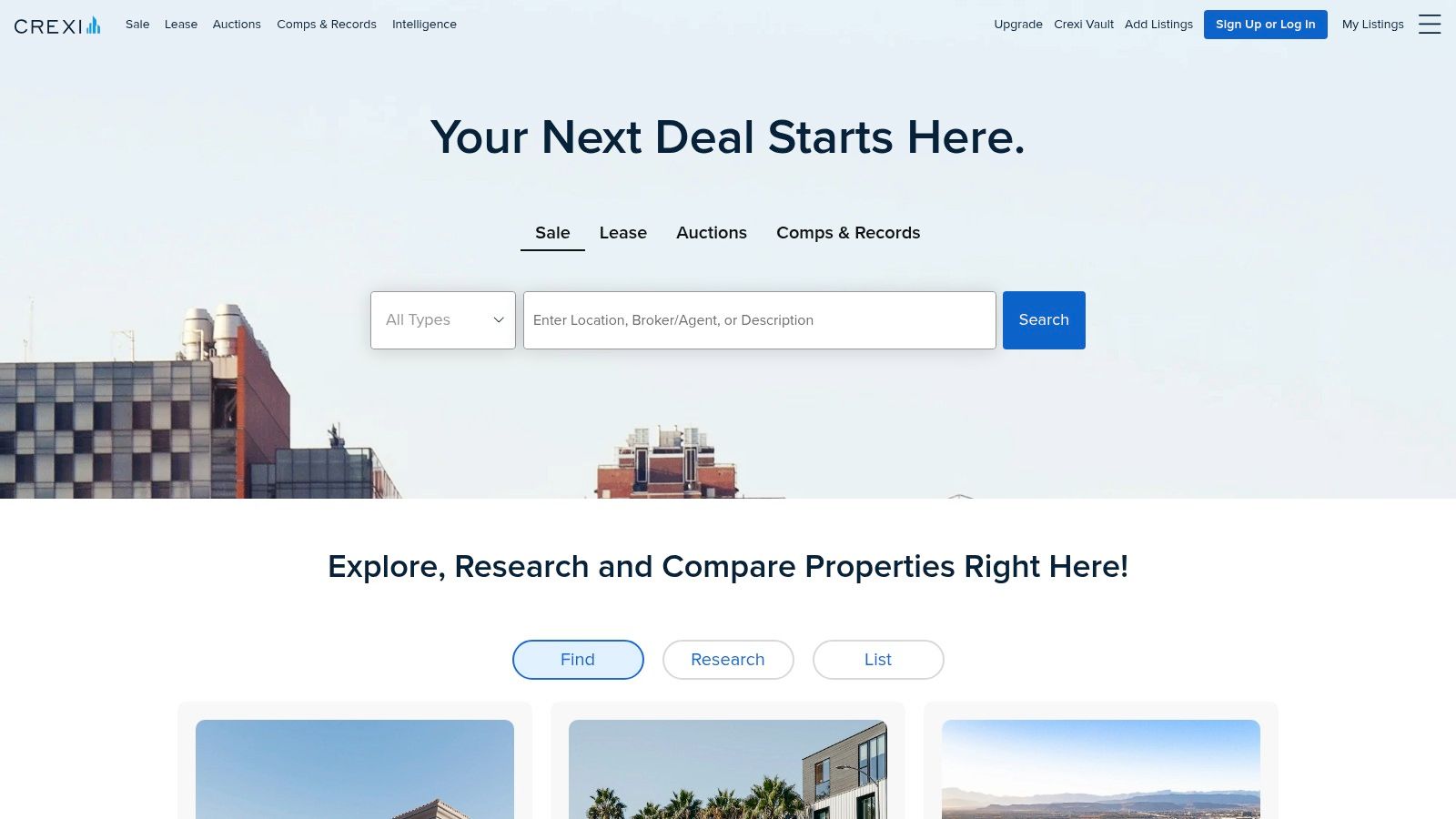
For investors and portfolio managers, Crexi’s Intelligence and PRO tiers unlock a deeper layer of market insights. These paid plans provide access to a vast database of sales comparables, off-market property data, and detailed market trend reports. This makes it one of the more comprehensive apps for commercial real estate when you need to conduct due diligence, identify acquisition targets, and understand submarket performance without committing to enterprise-level data subscriptions. The platform effectively bridges the gap between a pure listing service and a full-fledged analytics powerhouse.
However, many of Crexi’s most powerful features, such as advanced lead analytics and comprehensive comps, are gated behind its PRO subscriptions. While basic listing and searching are free, accessing the full suite of tools requires engaging with their sales team for a demo and custom pricing. This model can be a barrier for smaller operators or individual investors, but for active brokers and growing firms, the integrated marketing and data tools offer a compelling value proposition to accelerate deal flow and close transactions more efficiently.
- Best For: Commercial brokers, mid-sized investment firms, and tenants looking for an integrated marketplace with marketing and data tools.
- Pros: Modern all-in-one platform for listings and data, strong national reach for investment sales and leasing, user-friendly interface.
- Cons: Advanced intelligence and analytics are behind paid tiers, specific plan pricing requires a sales demo, not fully self-serve for PRO features.
- Website: https://www.crexi.com
4. VTS
VTS is a comprehensive leasing, asset management, and tenant experience platform designed for the institutional landlord and brokerage firm. It centralizes critical leasing data and workflows, moving teams away from scattered spreadsheets and into a collaborative, real-time environment. The platform offers a unified view of a portfolio, tracking everything from deal pipelines and tenant negotiations to lease expirations and market conditions. This holistic approach empowers large-scale owners to manage leasing activities from the initial lead all the way through to renewal with greater efficiency and speed-to-lease.
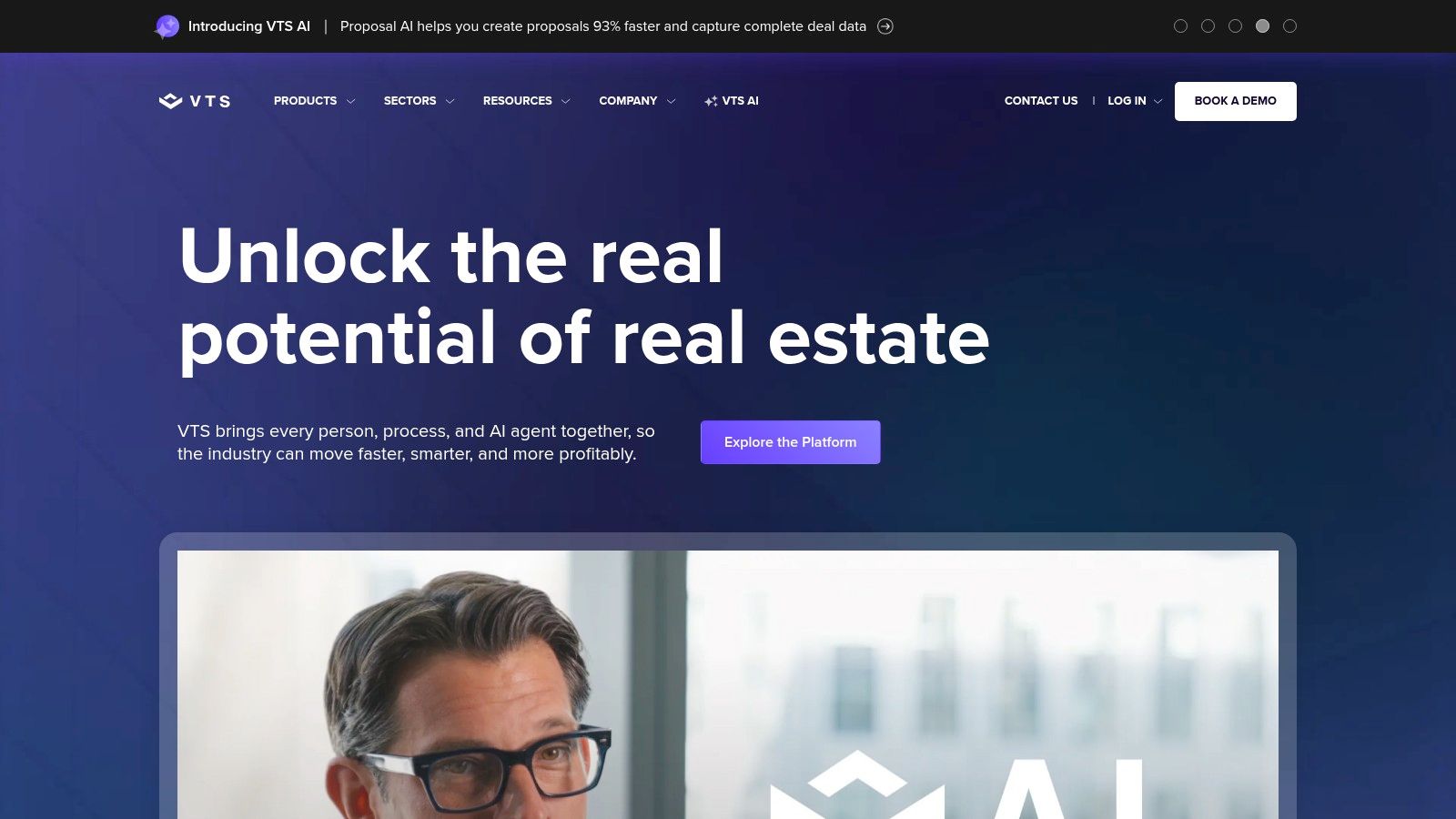
What truly sets VTS apart is its increasing focus on predictive analytics and AI. With its VTS 4 product, the platform leverages its massive proprietary dataset to provide predictive demand analytics, helping landlords anticipate market shifts and position their assets more effectively. Features like AI-powered proposal extraction and an analyst chatbot streamline previously manual tasks, freeing up asset managers to focus on high-value strategic decisions. The VTS Activate module further extends its utility into tenant experience, offering digital access, visitor management, and payment tools. As one of the leading leasing CRMs available, its integrated functionality is a key advantage. You can learn more about its role in the ecosystem by exploring a breakdown of top leasing CRMs on showdigs.com.
VTS is tailored for enterprise-level clients, and its pricing is not publicly available, requiring a direct demo and sales engagement. Implementation is a significant undertaking, demanding dedicated onboarding and change management to integrate the system into existing operational workflows. For institutional owners managing complex portfolios, however, VTS provides an indispensable toolset for optimizing leasing performance and asset value.
- Best For: Institutional landlords, large brokerage firms, and asset managers overseeing complex commercial portfolios who need a centralized leasing and management platform.
- Pros: Deep workflow integration for leasing and asset management, powerful predictive analytics and AI features, an all-in-one platform that includes tenant experience tools.
- Cons: Enterprise-focused pricing that is not public, requires significant organizational onboarding and process change.
- Website: https://www.vts.com
5. Yardi Breeze (Commercial)
Yardi Breeze targets a segment often overlooked by enterprise-level software: small to mid-sized commercial property managers and owners. It streamlines core property management functions into a cloud-based, user-friendly platform, eliminating the high costs and steep learning curves associated with more complex systems. Its primary value proposition is offering essential commercial-specific features like CAM (Common Area Maintenance) reconciliation, percentage rent tracking, and tenant portals with online payments, all within a transparent and accessible pricing model. This makes it an ideal entry point for growing portfolios transitioning from spreadsheets to a dedicated management solution.
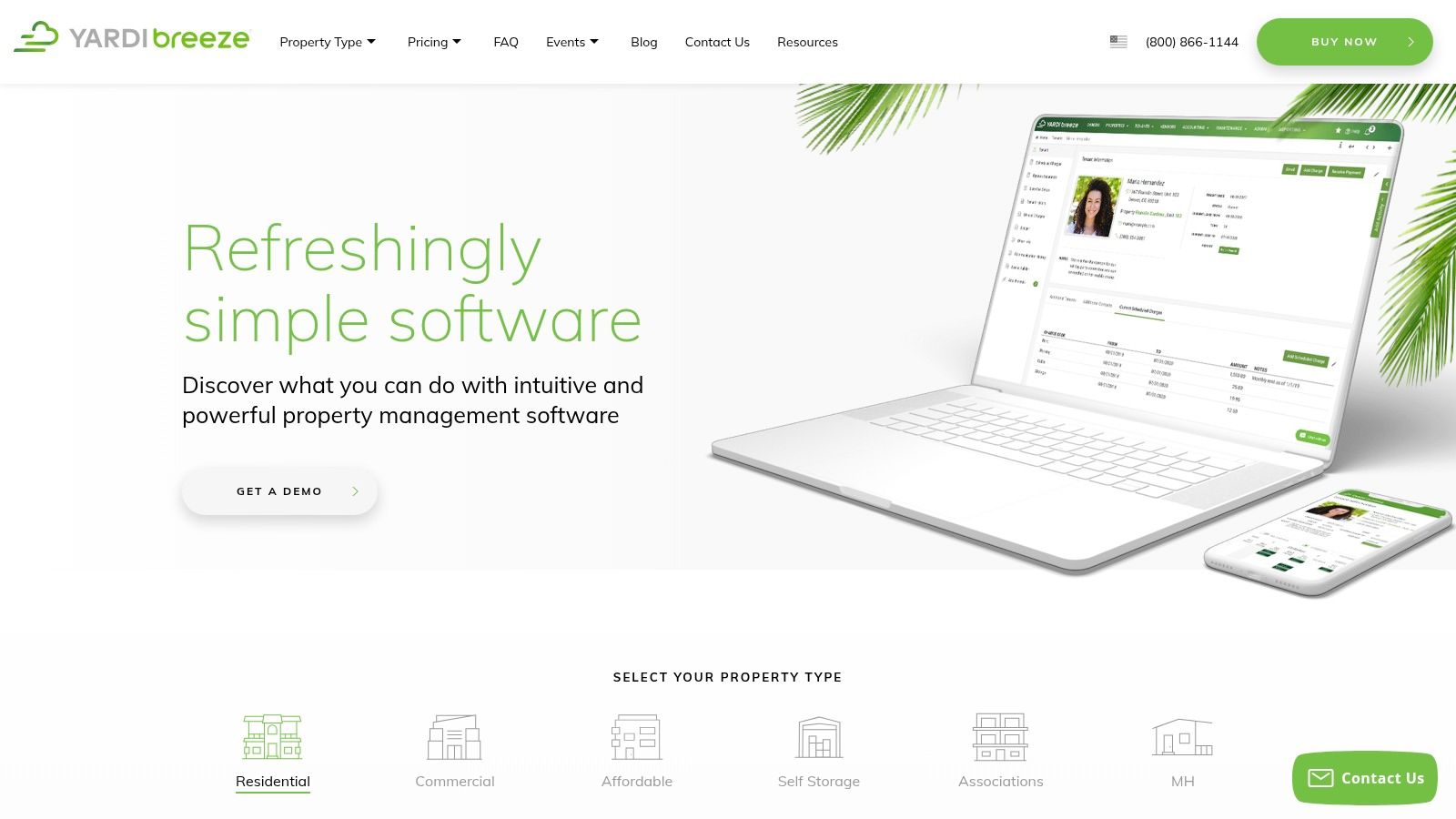
The platform is purpose-built for efficiency and ease of use, prioritizing quick onboarding and strong customer support. Features like built-in training and live chat support ensure that smaller teams can get up and running without significant downtime or the need for expensive consultants. For property managers seeking a straightforward tool to handle daily operations such as maintenance requests, vendor payments, and financial reporting, Yardi Breeze provides a robust yet manageable feature set. While it is one of the best property management software options of 2023, its simplicity means that companies with complex, multi-layered ownership structures or those needing deep corporate accounting integrations might find it limiting.
Yardi Breeze operates on a per-unit, per-month pricing structure, which is published directly on its website, a refreshing contrast to the opaque enterprise models common in the industry. However, accessing the more advanced features of its Breeze Premier tier often requires contacting their sales team. Despite this, for managers of retail, office, or industrial properties who need reliable, core functionalities without the enterprise-level overhead, Yardi Breeze is one of the top apps for commercial real estate that balances cost and capability effectively.
- Best For: Small to mid-sized commercial property owners and managers needing an all-in-one, user-friendly management platform.
- Pros: Transparent and affordable pricing, includes critical commercial features like CAM reconciliation, excellent customer support with no extra fees for onboarding.
- Cons: Less suitable for highly complex or large-scale portfolios, Breeze Premier pricing often requires direct sales contact.
- Website: https://www.yardibreeze.com
6. MRI Software (Commercial)
MRI Software stands as a cornerstone in the enterprise property management software space, offering a comprehensive and highly configurable platform designed for large, complex commercial portfolios. Far from a simple app, MRI provides an integrated ecosystem that centralizes everything from lease administration and accounting to facilities and investment management. Its strength lies in its modularity; global operators can connect various solutions to create a unified system that handles intricate financial reporting, tenant management, and operational workflows across diverse asset classes. This makes it one of the more powerful and scalable apps for commercial real estate operations.
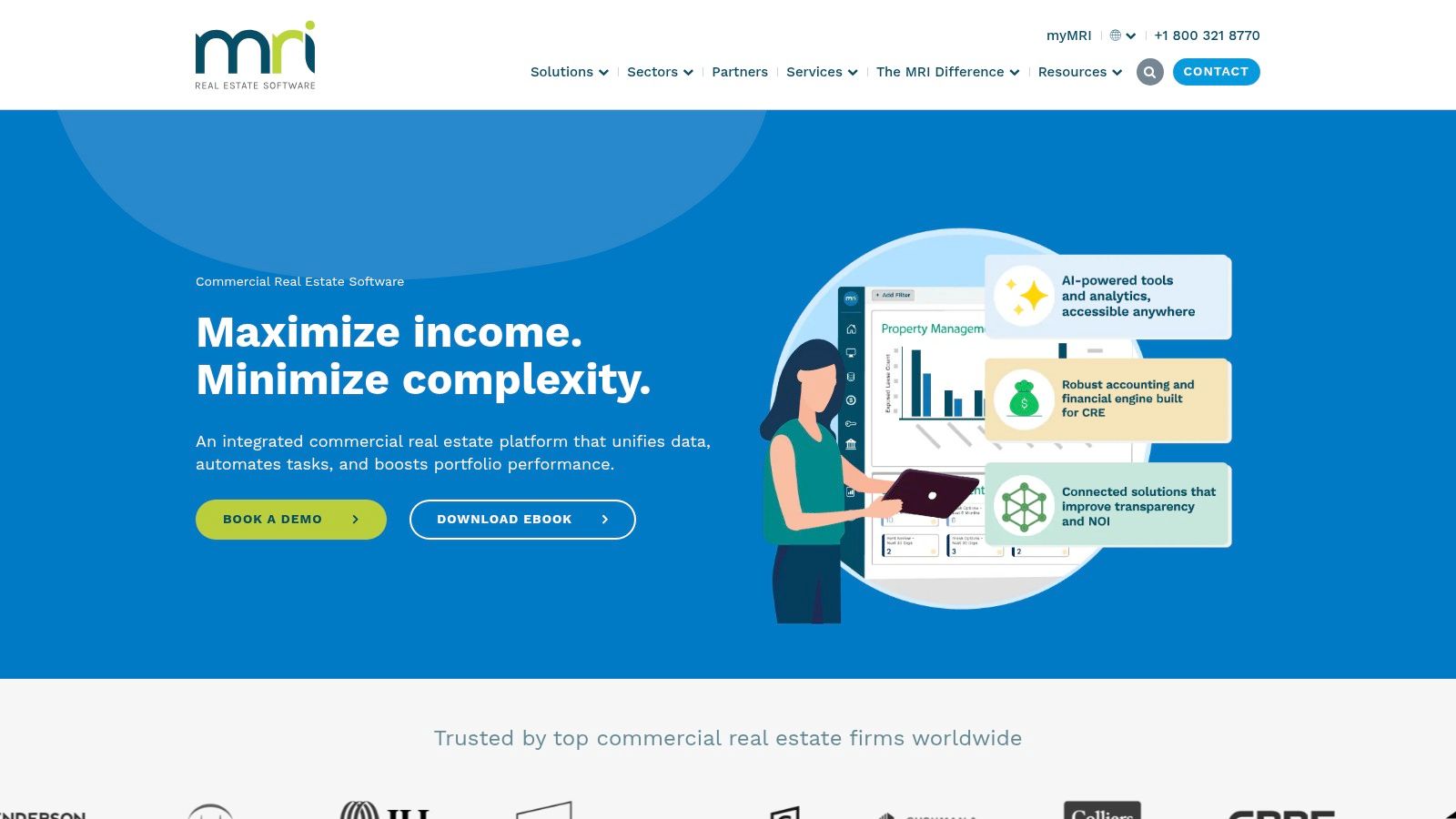
For large-scale portfolio managers, MRI’s robust accounting and reporting tools are a significant draw, providing the deep financial insights needed for strategic decision-making and investor relations. Features like its AI-powered lease abstraction tool (Lease Intelligence) and electronic signature capabilities (Secure Sign) are designed to accelerate leasing cycles and reduce administrative burdens. The platform's open and connected philosophy allows for extensive integrations, enabling firms to build a customized PropTech stack that aligns with their specific operational needs, from energy management to detailed investment modeling.
However, the platform's power comes with complexity. MRI is an enterprise-grade solution with pricing that is not publicly available and requires a direct sales consultation. The implementation process can be resource-intensive, and the sheer breadth of its functionality means a significant learning curve for new teams. Despite these considerations, for large, multi-market commercial real estate firms that require a highly adaptable and all-encompassing management system, MRI Software remains a leading choice in the industry.
- Best For: Large enterprise-level commercial property owners, global portfolio managers, and REITs needing a highly configurable and comprehensive property management ecosystem.
- Pros: Broad, modular platform covering all aspects of commercial management, long-standing industry focus with a global footprint, strong accounting and financial reporting capabilities.
- Cons: Enterprise-level pricing requires a sales conversation, significant implementation and training investment is often necessary.
- Website: https://www.mrisoftware.com/solutions/commercial-real-estate-software/
7. Buildout
Buildout is a specialized marketing and prospecting platform designed to streamline the entire deal lifecycle for commercial real estate brokerages. It excels at automating the creation of high-quality marketing collateral, from detailed offering memorandums (OMs) and proposals to property websites and email campaigns. By centralizing property data, brokers can instantly generate a full suite of marketing assets with consistent branding, significantly reducing the administrative burden and time required to bring a property to market. This focus on workflow efficiency makes it one of the essential apps for commercial real estate teams.
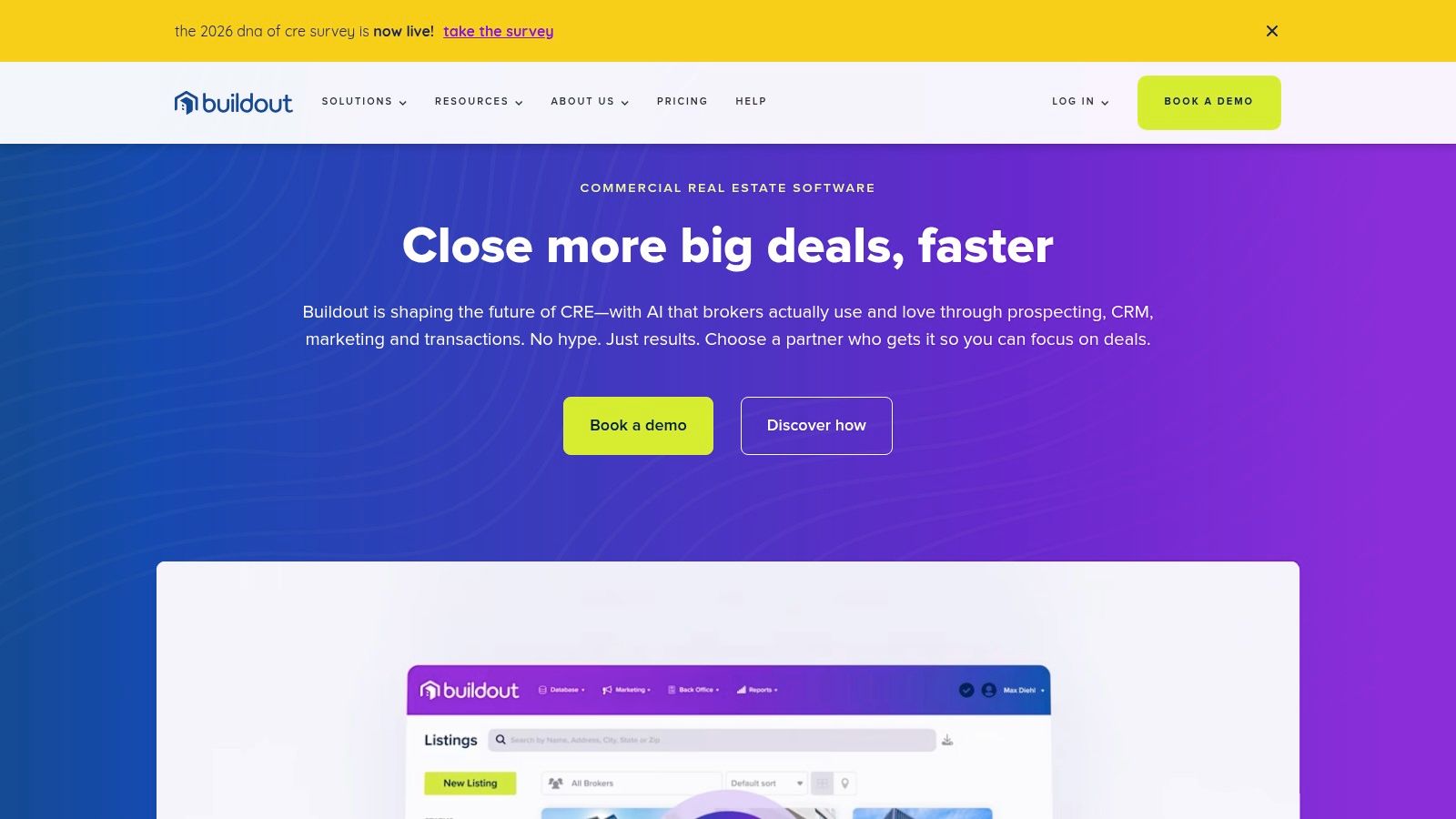
Beyond marketing automation, Buildout's Prospect tool adds a powerful data-driven layer for sourcing new business. It provides access to extensive property ownership data, complete with contact information and portfolio details, enabling brokers to identify and connect with potential clients more effectively. The platform's AI-powered discovery features help uncover non-obvious ownership connections and opportunities, integrating lead generation directly into the marketing workflow. This combination of asset marketing and owner prospecting in a single system is a key differentiator.
Pricing is more transparent than many enterprise solutions, offered in published tiers with per-broker fees plus a platform fee. While this can become costly for very large teams, the structure is generally seen as broker-friendly. The main trade-off is that some of the most advanced prospecting features are reserved for higher-priced plans. For brokerages focused on operational efficiency and a unified approach to marketing and business development, Buildout provides a comprehensive, purpose-built solution.
- Best For: Commercial real estate brokerages of all sizes seeking to automate marketing collateral creation and integrate prospecting workflows.
- Pros: Streamlines creation of professional marketing materials, integrates powerful owner/prospect data, offers published pricing tiers.
- Cons: Per-broker pricing plus platform fees can be expensive for large teams, most advanced prospecting tools are limited to premium tiers.
- Website: https://www.buildout.com
8. CompStak
CompStak introduces a unique, crowdsourced model to the world of commercial real estate data, focusing specifically on the granular details of lease and sale comparables. It operates on a "give-to-get" system where verified professionals like brokers, appraisers, and researchers contribute their own deal information to earn credits, which they can then use to access comps submitted by others. This innovative approach makes it one of the most valuable apps for commercial real estate professionals seeking real-world, hard-to-find data points like net effective rents, tenant improvement allowances, and concessions. The data is then reviewed and verified by an in-house team of analysts, adding a crucial layer of quality control to the crowdsourced information.
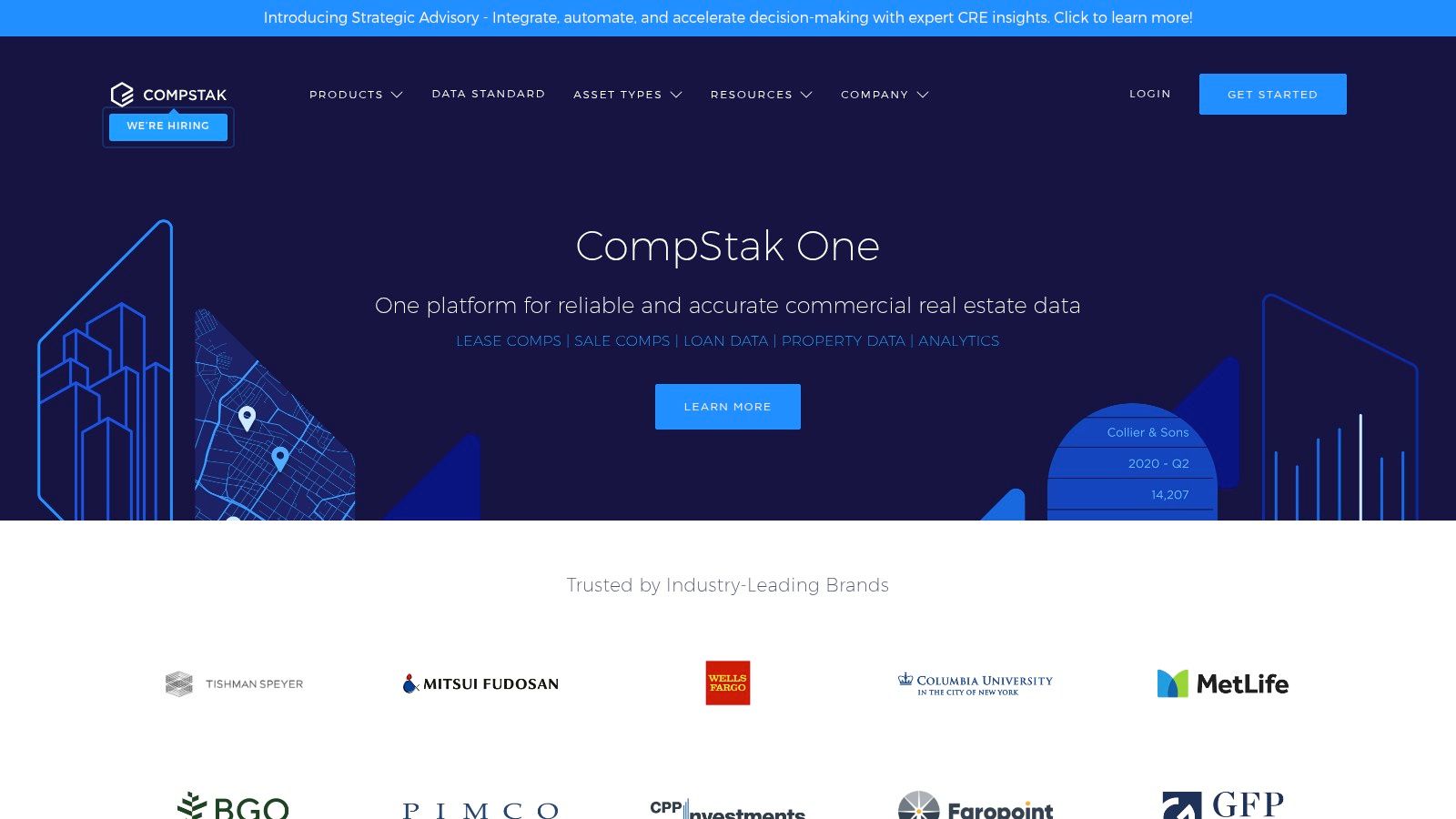
For a brokerage professional or an appraiser, this platform provides direct insight into the market dynamics that influence negotiations and valuations. Instead of relying solely on asking rents, users can see the actual terms of signed leases, providing a significant competitive advantage. The platform’s property pages and market dashboards aggregate this data, allowing users to analyze trends, track competitor activity, and set alerts for new comps in their target submarkets. This focus on verified, user-generated transaction data is what sets it apart from larger, top-down data providers.
While the free Exchange model is a major draw, access is strictly limited to qualified CRE professionals who can contribute data. For institutional investors, lenders, and asset managers who need broader access without the contribution requirement, CompStak offers an Enterprise license. This paid tier provides unlimited access to the full dataset and advanced analytics tools, but pricing requires direct contact with their sales team. The credit-based system of the free model can also be a hurdle for those who don't have a steady stream of comps to submit, making the Enterprise solution a necessity for larger teams.
- Best For: Brokers, appraisers, and researchers who can contribute deal comps to gain access to a highly granular, verified dataset.
- Pros: Unique crowdsourced model provides access to otherwise hidden deal terms, free access path for verified CRE professionals, analyst-verified data for quality assurance.
- Cons: Free access is limited to specific professional roles and requires consistent data contribution, Enterprise pricing is not public.
- Website: https://www.compstak.com
9. Reonomy (Altus Group)
Reonomy excels at uncovering off-market opportunities by providing deep, granular data on property ownership and financials. Acquired by Altus Group, it has become an essential tool for investors, developers, and brokers focused on prospecting and deal sourcing. The platform’s core strength is its ability to pierce through the corporate veil of LLCs to identify the true owners and decision-makers behind a property, a critical advantage for initiating direct outreach. Users can leverage over 200 filters to pinpoint properties that match highly specific investment criteria, from asset class and size to sales history and debt maturity dates.
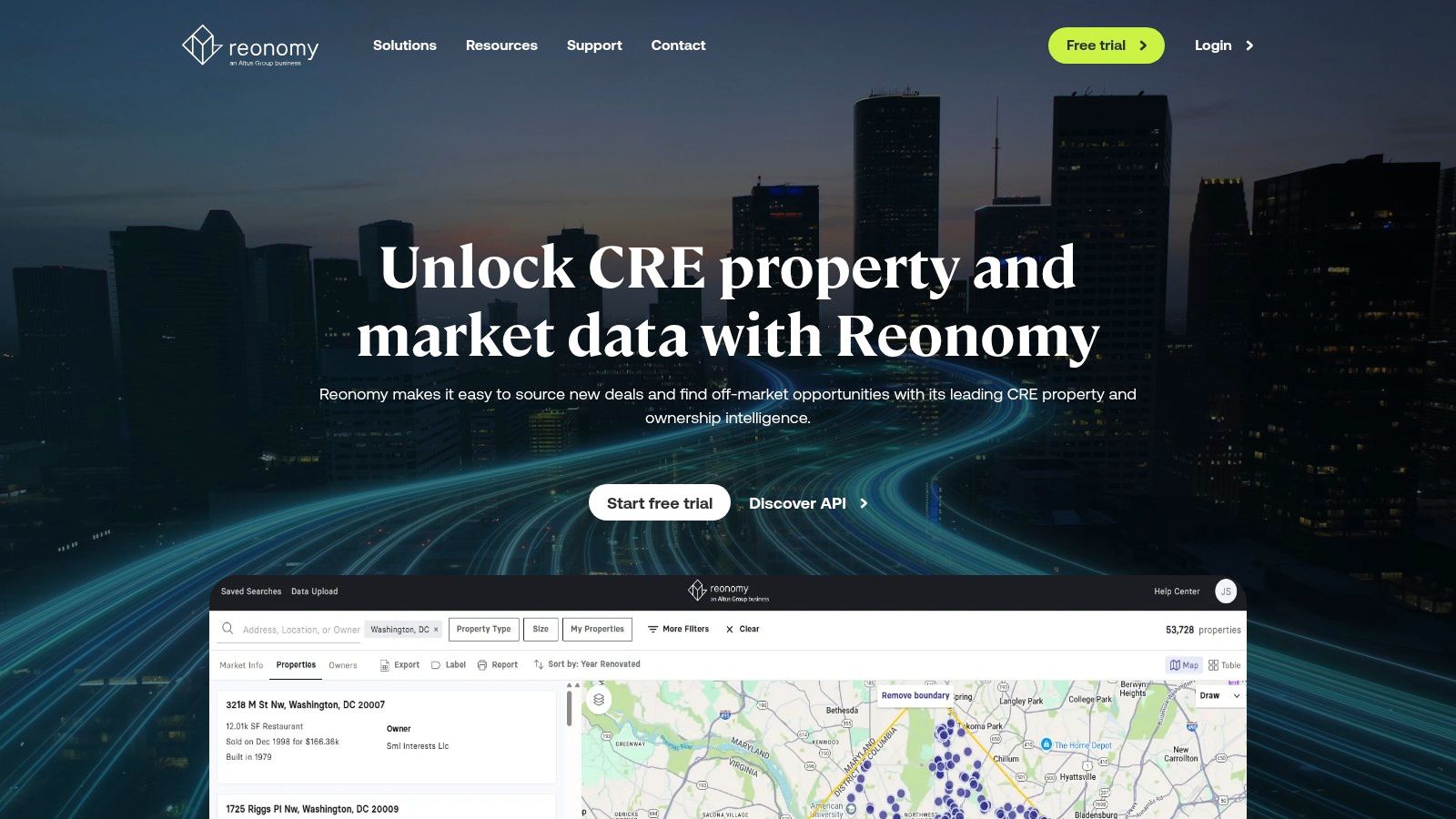
For portfolio-level analysis, Reonomy allows professionals to see an owner's entire collection of assets, revealing patterns and potential opportunities for larger, multi-property deals. This makes it one of the most powerful apps for commercial real estate prospecting available. Its web app is intuitive for targeted searches, while the available API enables large-scale operations to integrate Reonomy’s vast property intelligence directly into their existing CRM or workflow automation systems. This dual offering caters to both individual deal-makers and enterprise teams running sophisticated data-driven campaigns.
However, access to its most valuable data, particularly owner contact information and advanced insights, often requires higher-tier subscription plans. Like many enterprise-grade platforms, Reonomy does not publish its pricing publicly, necessitating direct contact with their sales team to get a quote tailored to your specific needs. While the initial data is robust, the cost of unlocking premium features can be a consideration for smaller firms or individual brokers.
- Best For: Investors, brokers, and developers focused on off-market deal sourcing and identifying true property owners.
- Pros: Excellent for prospecting and true-owner discovery, comprehensive portfolio-level ownership data, API access for integration into enterprise workflows.
- Cons: Premium features and contact data are locked behind higher-tier plans, pricing is not publicly listed and requires a sales consultation.
- Website: https://www.reonomy.com
10. Matterport
Matterport has become the industry standard for creating immersive 3D virtual tours, transforming how commercial real estate is marketed and viewed. This platform allows brokers, property managers, and owners to create detailed "digital twins" of their properties, offering prospective tenants and buyers an interactive, self-guided walkthrough from anywhere in the world. Its technology captures spatial data to generate not just visually impressive tours, but also dimensionally accurate floor plans and measurement tools, making it a powerful asset for space planning and due diligence. The platform's widespread adoption means its tours integrate seamlessly into major CRE listing sites, significantly boosting engagement and qualifying leads more effectively.
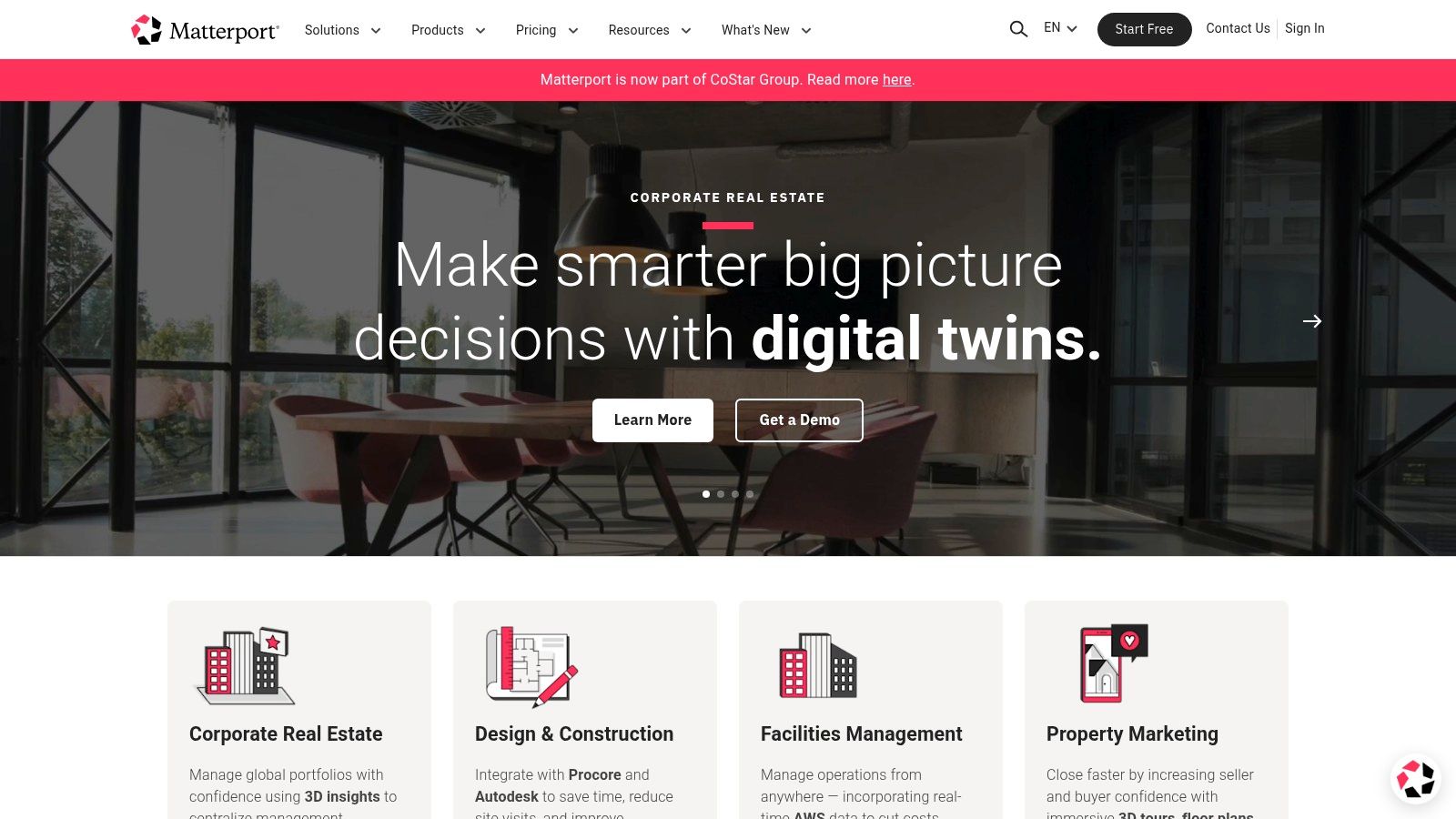
For portfolio managers with properties across different markets, Matterport offers scalable solutions, from DIY capture using a smartphone or 360° camera to a nationwide network of certified technicians who can handle the scanning process. This flexibility makes it one of the most accessible yet professional apps for commercial real estate marketing. The platform’s ability to export assets like floor plans, point cloud data, and even BIM files caters to a wide range of professionals, including architects and construction managers who need precise data for renovation or redevelopment projects. As remote deal-making becomes more common, the value of a high-fidelity virtual tour in reducing vacancy days cannot be overstated; you can learn more about virtual tours from Showdigs.com and their impact.
The platform operates on a freemium model, with tiered plans that scale based on the number of "active spaces" you manage. While basic hosting is accessible, users should be aware that advanced features like schematic floor plan generation or complex data exports often come with add-on fees. This pricing structure allows small operators to get started easily, but costs can accumulate for larger portfolios requiring more sophisticated outputs. Despite this, Matterport's brand recognition and proven ability to accelerate the leasing and sales cycle make it an essential tool in a modern CRE marketing toolkit.
- Best For: Commercial brokers, leasing agents, and property managers focused on high-impact digital marketing and remote property showings.
- Pros: Industry standard for high-quality 3D tours, scalable capture options from DIY to professional services, increases listing engagement and qualifies leads.
- Cons: Advanced exports and floor plan generation can involve additional fees, costs can scale with the number of active properties hosted.
- Website: https://matterport.com
11. Ten-X
Ten-X, part of the CoStar Group, has carved out a distinct niche as the leading online auction platform for commercial real estate. It provides a structured, technology-driven marketplace for brokers and owners seeking an accelerated disposition timeline. The platform's core value is its ability to compress the traditional sales cycle into a predictable window, often facilitating a close within 30-45 days of a successful auction. This process is supported by comprehensive pre-diligence materials made available to a pool of pre-qualified buyers, removing common contingencies and increasing transaction certainty.
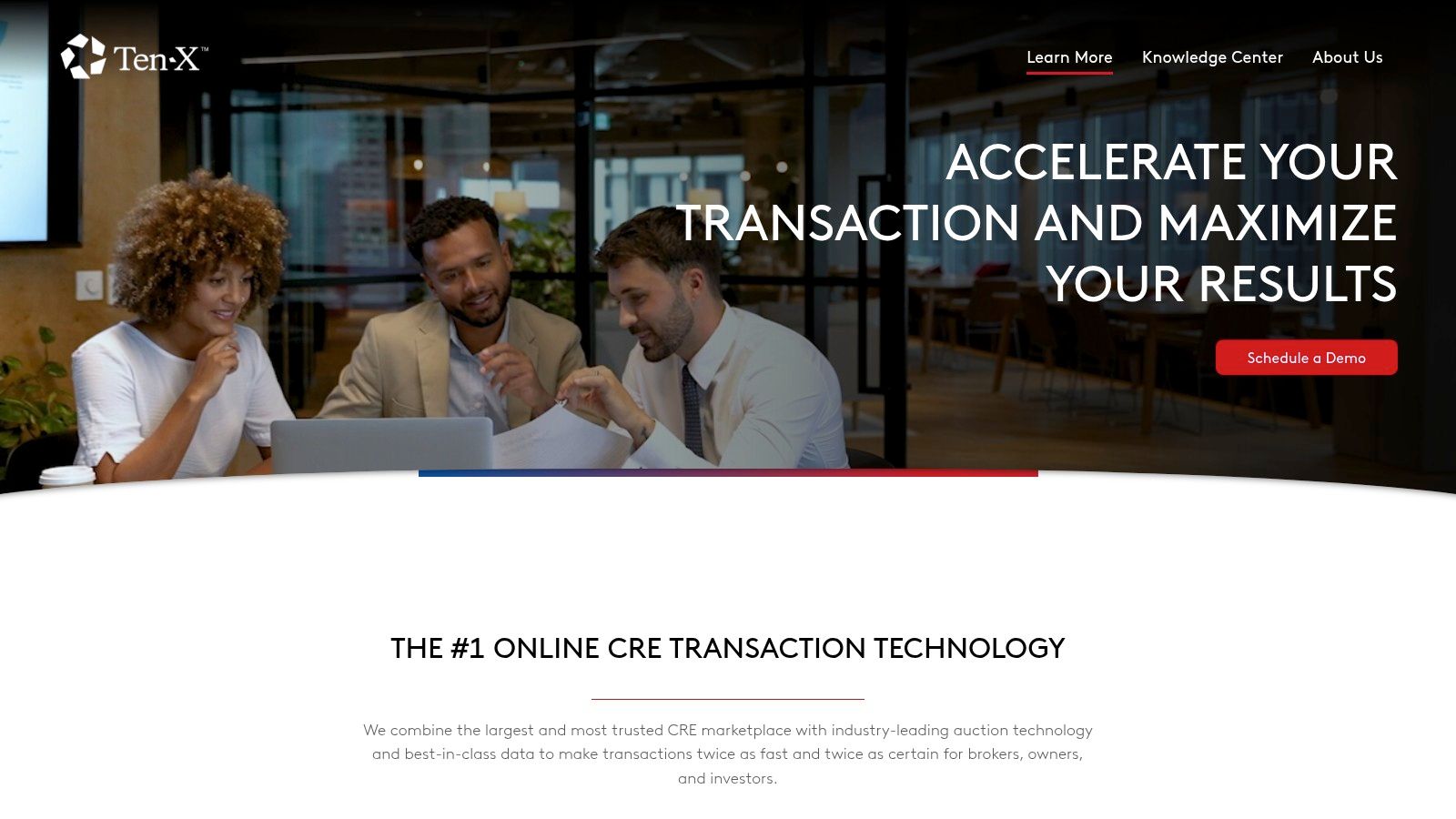
For sellers, Ten-X offers amplified marketing exposure by integrating listings with premium placement on LoopNet, reaching a massive global audience of potential investors. This enhanced visibility, combined with the competitive tension of a live auction, is designed to achieve true market value for an asset. The platform's transparent process and defined timelines are particularly beneficial for special servicers, institutional owners, or any seller prioritizing speed and certainty over maximizing a final sale price through a prolonged marketing effort.
However, the auction format is not a universal solution. It may not be optimal for highly unique or trophy assets that benefit from a more curated, relationship-driven sales process. Buyers must also account for the platform’s transaction fee, typically around 3% of the winning bid, which can influence their bidding strategy. Despite this, for distressed assets, bank-owned properties, or portfolios requiring rapid liquidation, Ten-X remains an indispensable tool among apps for commercial real estate, delivering efficiency and a high-velocity sales channel.
- Best For: Institutional sellers, special servicers, and brokers needing to execute an accelerated, certain sale for CRE assets.
- Pros: Predictable and accelerated sales timelines, large pool of pre-qualified investors, amplified marketing exposure via LoopNet.
- Cons: Auction format may not suit all asset types or seller goals, and the buyer transaction fee can impact final bidding prices.
- Website: https://www.ten-x.com/sell-commercial-real-estate
12. Dealpath
Dealpath is a purpose-built deal management platform designed for institutional commercial real estate investment and development teams. It moves beyond generic CRM or project management tools by providing a centralized command center specifically for acquisitions, development, and financing pipelines. The platform focuses on standardizing the deal execution process, transforming chaotic spreadsheets and email chains into a structured, collaborative workflow. This allows teams to track opportunities from sourcing to closing with complete visibility and accountability.
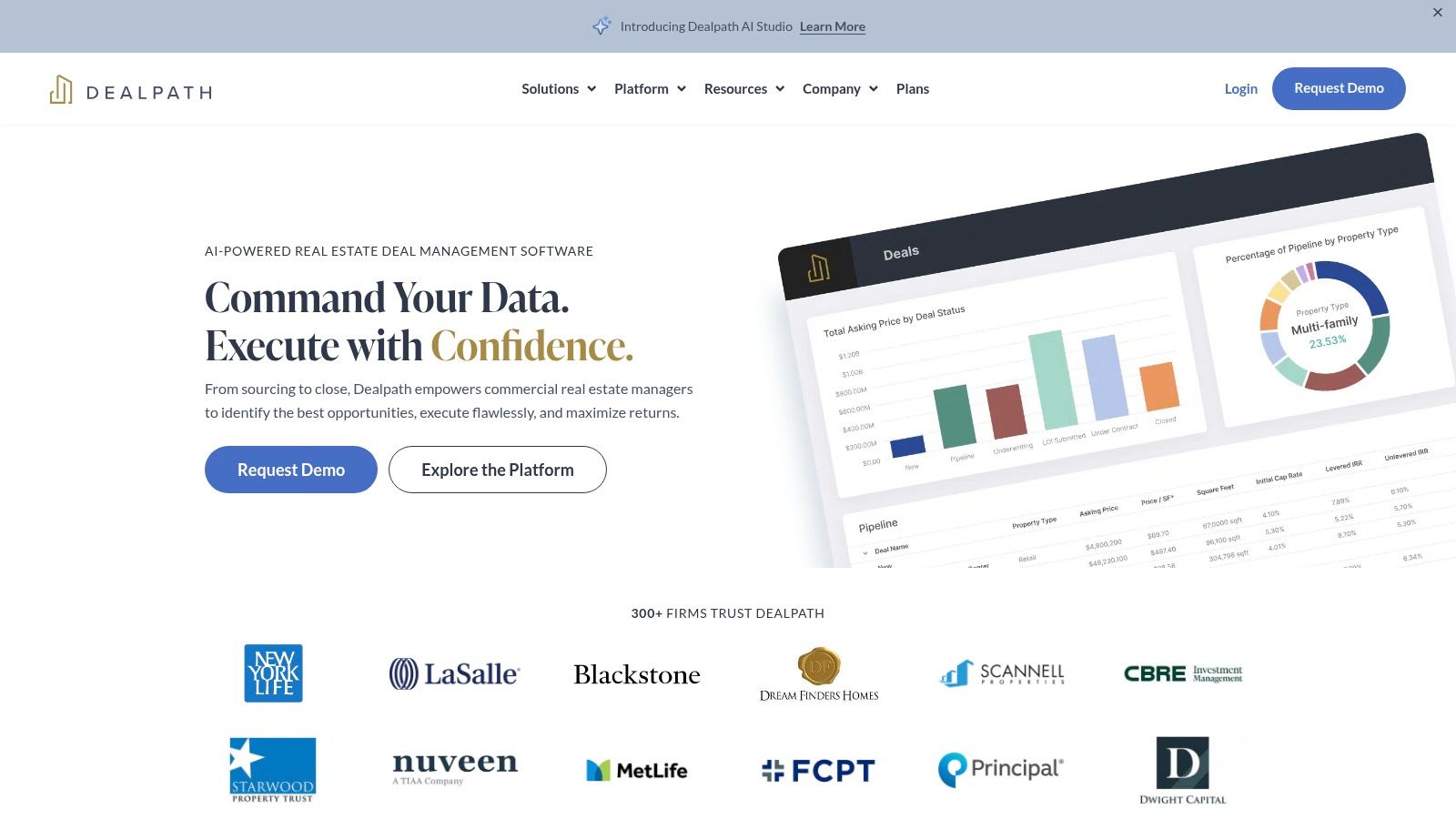
For investment committees and portfolio managers, Dealpath’s strength lies in its ability to generate real-time, configurable reports and analytics. Instead of manually compiling data for pipeline meetings, managers can pull up-to-the-minute dashboards that provide a clear view of deal flow, team capacity, and potential risks. This is one of the key apps for commercial real estate teams that need to accelerate due diligence and make faster, data-driven decisions. The system creates an auditable trail for every task and decision, ensuring compliance and improving post-mortem deal analysis.
However, Dealpath is an enterprise-grade solution with a corresponding commitment. Pricing is not public and typically requires a minimum user count, such as five users, making it unsuitable for individual investors or very small shops. Engaging with their sales team is necessary to get a custom quote. For institutional teams focused on scaling their investment operations and reducing manual work, Dealpath provides a critical infrastructure for high-velocity, organized deal execution.
- Best For: Institutional investment teams, developers, and CRE lenders needing to standardize and accelerate their deal pipeline and execution process.
- Pros: Purpose-built to reduce manual work and standardize deal execution, centralized pipeline and task management, designed for institutional deal teams to speed decision-making.
- Cons: Pricing is not public and requires direct sales engagement, typically requires a minimum user count making it less accessible for smaller teams.
- Website: https://www.dealpath.com
Top 12 Commercial Real Estate Apps — Feature Comparison
ProductCore featuresUX / QualityValue / PriceTarget audienceUnique selling pointsCoStarComprehensive CRE data, comps, market & risk analytics★★★★☆💰 Enterprise (sales-only)👥 Brokers, owners, lenders, appraisers✨ Largest CRE dataset; 🏆 deep verified comps & risk toolsLoopNetPublic listing marketplace, ad packages, marketing services★★★★☆💰 Paid listings & premium packages👥 Sellers, brokers, landlords✨ Massive audience (~13M/mo); 🏆 highest listing visibilityCrexiMarketplace + CRM, listing marketing, lead-gen & comps★★★★☆💰 Tiered PRO (demo required)👥 Brokers, owners, tenants✨ All-in-one deal marketing in modern UIVTSLeasing & asset workflows, tenant experience, predictive analytics★★★★☆💰 Enterprise (demo-only)👥 Institutional owners & leasing teams✨ Predictive demand analytics; 🏆 end-to-end owner workflowsYardi Breeze (Commercial)Cloud PM, CAM, tenant portal, payments, quick onboarding★★★★☆💰 Published, budget-friendly per-unit👥 Small–mid commercial owners/managers✨ Transparent pricing & low-friction setupMRI Software (Commercial)Lease admin, accounting, facilities, configurable platform★★★★☆💰 Enterprise (sales conversation)👥 Complex/global property operators✨ Modular suite + AI lease abstraction; 🏆 scalable for large portfoliosBuildoutCRE marketing automation: OMs, proposals, property sites★★★★☆💰 Published broker tiers (per-user fees)👥 Brokerages & marketing teams✨ Automated marketing collateral & prospect dataCompStakCrowdsourced lease/sale comps with analyst verification★★★★☆💰 Exchange credits for access; enterprise licensing👥 Brokers, appraisers, researchers✨ Crowdsourced + QA comps; 🏆 granular rent/concession fieldsReonomy (Altus)Property & ownership intelligence, transaction & debt data, API★★★★☆💰 Tiered (sales for full access)👥 Prospecting teams, investors, brokers✨ Wide ownership coverage (54M+); 🏆 strong owner-resolutionMatterport3D tours, floor plans, measurements, capture services★★★★☆💰 Free→Enterprise plans; capture fees apply👥 Brokers, marketers, listing teams✨ Industry-standard immersive 3D tours; 🏆 broad hardware supportTen-XOnline commercial auctions, pre-diligence, accelerated sales★★★★☆💰 Seller/buyer fees (buyer txn ~3%)👥 Owners & brokers seeking fast dispositions✨ Structured accelerated timelines; 🏆 large pre-qualified investor poolDealpathDeal pipeline, task workflows, reporting & analytics★★★★☆💰 Enterprise (min user counts)👥 Institutional acquisitions & investment teams✨ Centralized deal execution & audit trails; 🏆 speeds decision-making
Integrating Your Tech Stack for Maximum ROI
Navigating the crowded marketplace of apps for commercial real estate can feel overwhelming. As we've explored, the landscape is rich with powerful solutions, from listing giants like CoStar and Crexi to comprehensive management platforms like Yardi and MRI, and specialized data powerhouses such as Reonomy and CompStak. However, simply adopting these tools in isolation is not enough to drive transformative results, especially for large-scale operators managing distributed portfolios. The true competitive advantage lies not in the individual apps themselves, but in how they are strategically integrated into a cohesive, automated ecosystem.
For enterprise-level property management companies, the goal is to create a seamless flow of data that turns disparate operational activities into a unified, revenue-generating engine. Your core property management software should serve as the central nervous system, connecting marketing, leasing, analytics, and tenant management into a single source of truth. This integration eliminates the costly inefficiencies of manual data entry, reduces the risk of human error, and provides real-time visibility into portfolio-wide performance.
From Individual Tools to a Unified Strategy
The journey from a collection of apps to an integrated tech stack requires a clear, strategic approach. Before committing to a new platform, your operations team must ask critical questions about its ability to connect with your existing systems.
- API and Integration Capabilities: Does the app offer a robust API? Can it easily connect with your current property management software, CRM, and accounting systems? A tool that operates in a silo creates more work than it saves.
- Workflow Automation Potential: Can you build automated workflows between platforms? For example, can a lead generated on LoopNet automatically populate your CRM, trigger a follow-up sequence, and schedule a tour without manual intervention?
- Data Centralization: Will this app contribute to a unified view of your portfolio, or will it create another data island? The objective is to consolidate metrics on vacancy rates, lead-to-lease velocity, and tenant retention in one accessible dashboard.
Key Takeaways for Building a High-Performing CRE Tech Stack
As you evaluate the apps detailed in this article, remember that the "best" tool is the one that best fits your operational model and scales with your growth. The principles driving efficiency in large residential portfolios, such as a relentless focus on reducing Days on Market (DOM) and optimizing the lead-to-tour conversion rate, are just as critical in the commercial space.
Consider the operational bottlenecks that cost your portfolio the most revenue. Is it the time it takes to schedule property tours? Is it a lack of accurate, on-demand market comps? Or is it the administrative burden of managing lease documents and tenant communications? Pinpoint your biggest challenges and prioritize solutions that directly address them. By implementing and integrating the right apps for commercial real estate, you can build a scalable, data-driven operation that minimizes vacancy, enhances tenant satisfaction, and ultimately, maximizes the return on every asset in your portfolio.
While many of the tools discussed focus on the unique demands of CRE, the core challenge of efficient leasing is universal. If your portfolio includes single-family rentals or multifamily units without onsite staff, see how Showdigs leverages on-demand agent networks and intelligent automation to slash Days on Market and convert leads faster. Discover a specialized solution for residential leasing efficiency at Showdigs.




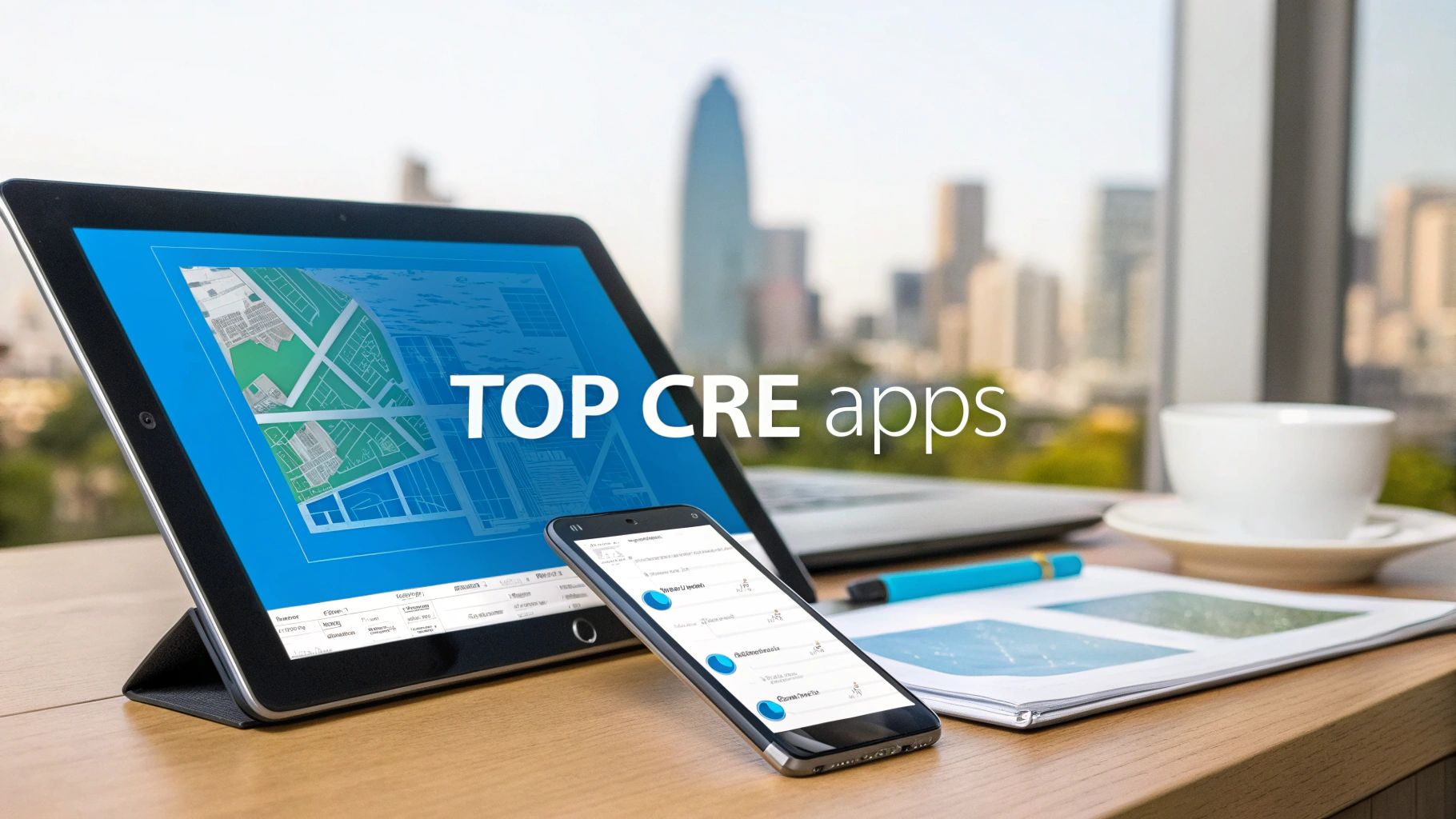
.png)
.png)
.png)